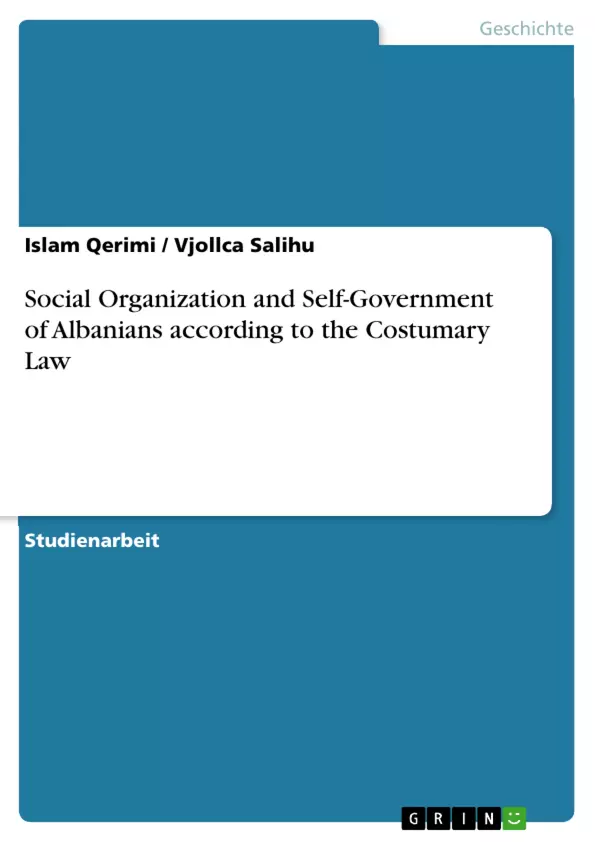The focus of this research is about Albanian’s social organization and self-government from early developments and forms of social organization under customary law until the codification of Albanian customary law. This research further shows the importance of the albanian codes during social organization ; Old Kanun, The Kanun of Lekë Dukagjini ,The Kanun of Çermenikë, The Kanun of Labëria, and Kanun of Skanderbeg; but with great emphasis on The Kanun of Lekë Dukagjini, used mostly in northern Albania and Kosovo, which was developed by Lekë Dukagjini who codified the existing customary laws. Dispite historical challenges Albanian self-organization for self-government had a unique resistance in the history of unequal wars and achieved recently to turn the desire for creation of the state of Kosovo into a new reality. Today this social organization willingness of Albanians self-government has taken a new political, legal, economic and social dimension, establishing basis of a new modern European state.
Inhaltsverzeichnis
- The beginnings of self-organization of the Albanian nation under the costumary law
- Common and legal resources for organizing Albanian self-government in the Middle Ages
- Albanians self-government under the costumary law from the nineteenth century until today
- Some forms of social organization and self-government of Albanians under costumary law in recent centuries
- The consequences for the albanian nation from foreign governments, as well as its efforts
- Some examples of organizationfor national self-government based on the albanian costumary law
Zielsetzung und Themenschwerpunkte
Diese wissenschaftliche Arbeit befasst sich mit verschiedenen Aspekten der sozialen Organisation und Selbstverwaltung der Albaner im Kontext des Gewohnheitsrechts. Die Arbeit untersucht die historische Entwicklung und die Bedeutung des Gewohnheitsrechts für die albanische Identität und die Aufrechterhaltung der Autonomie in verschiedenen Epochen.
- Die Rolle des Gewohnheitsrechts in der Selbsterhaltung der albanischen Nation
- Die historische Entwicklung von Selbstverwaltungsstrukturen bei den Albanern
- Die Auswirkungen von fremden Mächten auf die albanische Selbstverwaltung
- Bedeutung des Kanun von Lekë Dukagjini für die albanische Gesellschaft
- Die verschiedenen Formen der sozialen Organisation und Selbstverwaltung im Laufe der Geschichte
Zusammenfassung der Kapitel
- Kapitel 1: The beginnings of self-organization of the Albanian nation under the common law: Dieses Kapitel erläutert die Bedeutung des Gewohnheitsrechts (Kanun) für die Albaner und vergleicht es mit anderen europäischen Traditionen. Es werden die Anfänge der Selbstorganisation und die Rolle von Stammesversammlungen, Patriarchatsfamilien und Ältestenräten in der albanischen Gesellschaft beleuchtet.
- Kapitel 2: Common and legal resources for organizing Albanian self-government in the Middle Ages: Dieses Kapitel untersucht die Rolle von Codes und Kanunen während des Mittelalters, insbesondere den Kanun von Lekë Dukagjini. Es wird die Bedeutung dieses Kanuns für die soziale und rechtliche Ordnung in Nordalbanien und im Kosovo hervorgehoben.
- Kapitel 3: Albanians self-government under the costumary law from the nineteenth century until today: Dieses Kapitel beleuchtet die Weiterentwicklung der Selbstverwaltung unter dem Gewohnheitsrecht im 19. Jahrhundert bis zur Gegenwart. Es wird die Anpassung des Kanun an die sich verändernden gesellschaftlichen Bedingungen und die Rolle des Kanuns in der albanischen Gesellschaft untersucht.
Schlüsselwörter
Die Arbeit konzentriert sich auf das Gewohnheitsrecht, die Selbstverwaltung, die soziale Organisation, die albanische Identität, Kanun von Lekë Dukagjini, Stammesversammlungen, Ältestenräte, Patriarchatsfamilien, Illyrische Kultur, Mittelalter, osmanische Herrschaft, und die Rolle von Fremdmächten auf die albanische Gesellschaft.
Häufig gestellte Fragen
Was ist der "Kanun" in der albanischen Kultur?
Der Kanun ist ein jahrhundertealtes System des albanischen Gewohnheitsrechts, das soziale Organisation, Ehre und Selbstverwaltung regelte.
Wer war Lekë Dukagjini?
Er war ein albanischer Fürst, dem die Kodifizierung des bedeutendsten albanischen Gewohnheitsrechts, des "Kanun von Lekë Dukagjini", zugeschrieben wird.
Welche Rolle spielten Stammesversammlungen?
Stammesversammlungen und Ältestenräte waren die zentralen Organe der Selbstverwaltung, die Konflikte lösten und über gemeinschaftliche Angelegenheiten entschieden.
Wie überlebte das Gewohnheitsrecht fremde Herrschaft?
Trotz osmanischer oder anderer Fremdherrschaft bewahrten Albaner durch den Kanun eine einzigartige Form der sozialen Autonomie und Identität.
Hat der Kanun heute noch eine Bedeutung?
Obwohl moderne Gesetze gelten, beeinflussen kulturelle Aspekte des Kanun weiterhin soziale Normen und das Verständnis von Ehre in einigen Regionen.
- Citar trabajo
- LL.M. Islam Qerimi (Autor), Vjollca Salihu (Autor), 2011, Social Organization and Self-Government of Albanians according to the Costumary Law, Múnich, GRIN Verlag, https://www.grin.com/document/174363



